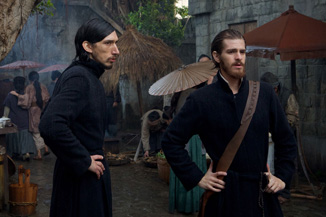Movie Review: Silence
By Steven Slater
February 11, 2017
BoxOfficeProphets.com

Silence is fairly simple, a parable tale of a Jesuit’s moral journey as he attempts to find a lost priest rumored to have apostatized in Japan, a country known to be hostile to Christianity in the early 17th century. The Jesuit Rodrigues, played by Andrew Garfield, is the man whom the audience is meant to journey with. The priest, Father Farreira, played by Liam Neeson, is for whom he searches, and provides a foundation and goal for both the film and Rodrigues.
Without spoiling the tale, because the journey is what creates the film’s message, let me say that nothing is black and white. There are no absolute good guys, nor absolute evil people, although general lines are drawn between distinct groups of individuals. However, there is always an understanding of why each person is acting in their own way. Most frustrating, perhaps, is the lapsed Christian Kichijiro, who by turns seems devout and a coward, but most other characters are easier to pin down. Ultimately, the story is about Rodrigues’ faith; what he believes, how that faith is tested, and how he resolves his inner conflict between pure faith and living his human life.
One need not be Christian, or even religious, to find the story and personal conflicts arresting. From a purely technical standpoint, Silence is well made and very well acted. But this film requires a deeper introspection than an audience may be used to, and therefore most filmgoers may avoid it. Scorsese makes films that are truly about faith, rendering them important and timeless. Even though they will make less money than the more palatable faith-based films, his films seek to probe at the real foundational questions that drive belief. It is therefore perhaps a feeble hope that his films will live on as the true film-based teachings of faith; a small hard token found half-buried in dirt while hiking along a trail, while other more easily digestible religious films vanish like a large puff of smoke from a fireworks display. I suppose, in the end, if you want to think about the ideas this film traverses, go see it. To simply view it for the performances or direction seems beside the point.
Slater Grade: A-